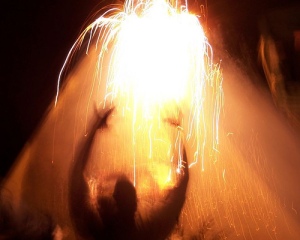I TRIED to clip down this gagavision 41 video to focus on a perfect example of how not to create encounters with pop stars. But I couldn’t. (I’m not the techie I hoped I could be.)
There are parts that could offend some of you, my readers. If Lady Gaga offends you, you are certainly not alone and I respect your perspective. In that case, I urge you to not watch this video–at all. The parts I refer to happen at minute 2:20 – 4:00, and are suitable for audiences over age 10. My advice is to skip the other parts, primarily because they do not refer to this post.
The scoop: It appears a Christian Fundementalist gave Lady Gaga a card/tract that said, “Get Out of Hell Free.”
In a far friendlier tone than I can image approaching hostile protesters, she said, “Hi, I’m Lady Gaga.” and they said, “What do I care?”
What I find so interesting is that she bothered to talk to them, and tell them she did believed in God, and that she had Christian influences in her formative years. It was like she was trying to find common ground. A novel concept for approaching those you disagree with, huh?
They were more concerned with showing their opposition, and contempt for her. From her comments, it seems to me, that their actions, got to her, at least for a little bit. They bothered her. She said that she didn’t want her fans to have to see that, but it seemed to bother her on a personal level, as well. (But, sadly, NOT in a way that would likely bring her to a closer fellowship with followers of Jesus.) I would really like to hope that Gaga would not lump these loonies with authentic followers of Jesus. I hope it wouldn’t sour her on the whole bit.
Maybe these people just couldn’t find a Koran to burn that night, or something.
At best, the whole encounter would be confusing, or hurtful to her, or anyone. Hurtful? To a super star, really? Yeah, that’s my guess. Because, I think she’s mostly a regular 25 year old young woman. Like almost all of us, she wants to be liked and not be disparaged and maligned.
It’s easy to hear the condescending tone from the protester speaking, and his smug uses of the word “darling”. In snide fashion he tells her that the book “with the black cover, and the gold pages, and the ribbon down the middle” will show her she has “pervert ways”. It seems he’s piecing it all together for her, in case she’s not aware of the visual image of a Bible. Really, a sweetheart…um. NOT!
Ya know, these are not endearing traits of Christians. They are shameful ways to act. (I should put that word Christians in quotes, because I think they had their own agenda, and their “Good News” …sucked.)
Perhaps Get out of Hell Free signs, tracts, and cards, helped these protesters turn from sin and come to God. But, in most cases, relationships (read: legit friendships) are far more helpful. Their demonstration and literature was probably are more of a confusing message.
So, now we know how to not show God’s love and redeeming grace, right?
IT BEGS THE QUESTION:
What if there had been loving dialogue? What if the people who think they are doing God’s work, acted like Jesus, and started interacting with Stefani Germanotta on common ground, instead of peacocking self-righteousness on what they deem to be enemy lines.
Maybe you’re a Gaga monster, paws up, and everything. Or maybe you don’t care for Lady Gaga’s music or showmanship techniques, but will you share your take on Christianity / evangelism, and music stars?




